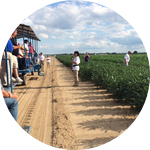About This Project
The use of neonicotinoids have been linked recently to causing honey bee kills through pesticide drift. This research will estimate baseline tolerance between strains of honeybees to several neonicotinoids by conducting diet incorporated bioassays. In addition, we are going to quantify residual insecticides in hive components by liquid chromatography equipped with a tandem mass spectrometer in 60 apiaries in Missouri (Summer 2016) to improve best management practices for beekeeping.
Ask the Scientists
Join The DiscussionWhat is the context of this research?
Insecticides such as neonicotinoids are a major approach of chemical control of row crop pests through use of seed treatments. Recently, the use of neonicotinoids has been linked to causing bee kills through pesticide drift.
There are 10 strains of honeybees that are available to beekeepers and each have their inherent properties that differ in behavior and tolerance to mite infestations and diseases, but what about their tolerance to neonicotinoids?
Our study will provide beekeepers information to choose a more neonicotinoid-tolerant strain, which is economically important for those who keep bees near agricultural fields.
Beekeepers will also learn if pesticide residues can build up to harmful levels when hives are near agricultural areas and foundation is not replaced often.
What is the significance of this project?
The purpose of this project is to determine if a more tolerant to neonicotinoid strain of honeybee can be available for commercial production, and to learn if honeybee foundation should be replaced more often in agricultural areas. Recently there has been a significant increase in the number of hobby beekeepers as the media spreads awareness of honeybee declines.
Missouri is a heavy agricultural state with row crops, fruit and nut production. All growers use neonicotinoids either by spray or seed treatment to control a variety of pests. Hives placed near fields have not been screened for the quantity of neonicotinoids in their beeswax, pollen, nectar, or bees themselves.
Screening for the honey bee with innate tolerance will benefit agricultural growers and beekeepers.
What are the goals of the project?
One of our goals for this project is to determine if any honeybee strain is innately more tolerant to neonicotinoids. Beekeepers in Missouri will be given the opportunity to have their hive components screened for key insecticides. Results of studies will be presented to beekeepers at local beekeeping association meetings. Results of this study will improve best management practices for beekeeping in general.
Budget
In the pesticide lab, honey, foundation, pollen and honeybee samples will be extracted and analyzed by liquid chromatography equipped with a tandem mass spectrometer for the detection and quantity of these chemicals.
Sweetwater labs in Glascoe, Missouri is an independent contractor for University research and will be conducting the research at cost.
Endorsed by
Meet the Team
Team Bio
My lab estimates the susceptibility of pests of row crops such as tobacco thrips, tarnished plant bug, corn earworm, and sugarcane aphid to key insecticides. These results aid growers in their management decisions.
Field work includes small plot trials where we test the efficacy of new pesticides and fungicides.
We recently established an apiary at the center, and have a graduate student who is conducting honey bee research.
Moneen Jones
Moneen Jones, Ph.D., is an Assistant Professor at the University of Missouri, Fisher Delta Research Center, Portageville, Missouri. She is currently a row crop entomologist who helps growers of rice, cotton, soybean, sorghum, and corn use integrated pest management to balance economics with conservation of beneficial insects.
At age 28, she went back to college with the intent of getting a bachelors degree in psychology. That major later changed to Biology when she realized you could get paid to work outside in jeans and a tee shirt as a Biologist. She earned a BS in Biology from Elmhurst college (2001), a MS in Biology (Northeastern Illinois University, 2006), a MA in Geography & Environmental Science (NEIU, 2006), and a Ph.D. in entomology at the University of Illinois, Urbana-Champaign (2010).
In 2010, she accepted a postdoctoral research and extension entomologist position at the University of Florida in Immokalee, Florida. Her research focused on management programs for the Asian citrus psyllid (ACP), the vector of citrus greening disease.
Following her postdoc appointment, she accepted a faculty position in August of 2013 as an Assistant Professor of Research in Entomology at the Fisher Delta Research Center (University of Missouri).
In March 2015, she started the Missouri Pollinator Conservancy Program. The program helps to benefit the more than 400 native species of bees and pollinators in the state of Missouri.
This year, she started the Master Beekeeper Certification Program for Missouri beekeepers. The education benefits the more than 3,000 hobby beekeepers of Missouri.
Jones lives with her four dogs (Milo, Yumi, Cosette, and Joli) and two cats (Mouflette and Missy) in a small town of 713 in the Bootheel of Missouri. She enjoys knitting, crafts, and rubber stamping. She also loves collecting civil war currency, fountain pens, antique glass, and pocket watches.
Additional Information
Missouri and the Mid-South are heavy agricultural areas with emphasis on row crops that use neonicotinoid seed treatments. Because honeybees and row crops need to co-exist, we wish to screen honeybee strains to determine if one is innately more tolerant to these chemicals. We will also use liquid chromatography equipped with a tandem mass spectrometer to quantify commercial insecticides in nectar, pollen, beeswax and bees in 60 apiaries to determine their effect on bee health.
Project Backers
- 6Backers
- 5%Funded
- $254Total Donations
- $42.33Average Donation

